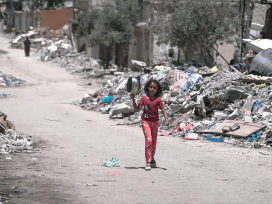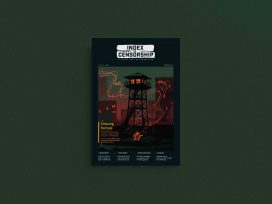The last of the media barons has fallen to President Putin’s need to control his image and determine the news agenda.
The nature of Russian politics in the 1990s was best described as a ‘media-political system’. At a time when the state’s institutions were unstable and rootless, and with Boris Yeltsin provoking one political crisis after another, the channels through which the public could be influenced were the television channels; and they were crucial to the outcome of political power struggles.
When political scientists complained that Russia lacked a civilised party system and that only the communists had a mass membership party, they failed to recognise that it was the TV channels that were the real political parties. They were fundamental to the acting out of the political drama and in determining the ratings of the actors on the political stage. In the year preceding the 1996 elections they evolved into the agents, as it were, of the conventional parties and political movements. SPS (Union of Rightist Forces) and Yabloko (Apple/me-block, the liberal alliance led by Grigorii Yavlinskii) were the parties of NTV (Vladimir Guzinskii’s channel); Edinstvo (Unity) belonged to ORT (main state-owned channel); Otechestvo (Fatherland) was the creature of TVTs (Moscow-based Television Centre) and the regional companies.
A prerequisite of the system was a willingness on the part of the state to tolerate the existence of powerful and at times wholly independent players in Russia’s media-political structure. The reasons are simple: as a populist politician, Yeltsin remembered a time when the only people on his side had been the journalists, yet he had prevailed; and in the run-up to the presidential election – the only one that mattered – the assets of the owners of the media conglomerates became Yeltsin’s political capital.
By the time of Vladimir Putin’s election campaign, when the second war in Chechnya was already in the offing, it became clear that the media-political system would not survive the new election. Though the 2000 elections were managed by Yeltsin’s old team, Putin lacked his predecessor’s charisma and, if he was to dominate the air waves, he needed the support of the bureaucracy and direct control of the channels.
The first sign of what was to come was the auction of TVTs frequencies; the second, the removal of Boris Berezovskii from control of Channel One. The raid on Guzinskii’s NTV on 11 May 2000, only four days after Putin’s inauguration as president, was [at the time of writing Ed] the final stage of a transformation that further tightened the administration’s grip on the political scene. [Since then, Berezovskii’s TV6 was manipulated into receivership in 2001 and is scheduled for public auction in March this year. Ed.]
The Kremlin has pursued its unabashed intention of controlling the politically most influential federation-wide television stations by direct legal pressure and by use of the TV frequency licensing system. Any TV or radio company accused of infringing the law may find itself without a licence. If the authorities continue along their present course, sooner or later they will have the entire federal TV network and its power to influence the media-political system under their control.
Central control of the privately-owned independent press, formed in the 1990s, is a different matter. Shut down a newspaper and it merely re-appears next day under a new title and with a threefold increase in circulation; its decentralised structure makes it harder to regulate. If state control of TV becomes excessively rigorous, the press may gain a competitive edge over television and recover some of its former prestige. Journalists may also rediscover the virtues of professional solidarity when faced by official attempts to determine their news agenda.
The Web is even less manageable and may be the best guarantee that the liberalising changes in the Russian information system are irreversible. This, together with the development of satellite television may, within five years or so, see the importance of national television much reduced. Meanwhile, as the incident indicated, the conventional mass media is perfectly capable of mobilising public opinion when it deals with things that are of intimate concern to its audience. The public itself can be unexpectedly agile at critical moments in choosing between the information media.
On one level, the effects of the present transformation are obvious: newspapers are full of that same turgid discourse of years gone by, as unreadable today as when it was printed in Pravda in 1982; even the dramatic seizure and closure of NTV was reduced to little more than a footnote. Business publications may continue to provide information, but most newspapers are busy dumbing down the reality of Russia today, either by touting the new ‘National Idea’ or by trying to exorcise its ghost. In a word, the country’s press is once more profoundly provincial.
The changes on television, an emasculated shade of its former self and dominated by imported game shows, sports coverage and soap operas, are even more striking.
Communication is as much about withholding as transmitting. Our nostalgia-drenched media is daily less informative, more ritual in its observance of the business of communication. To free us from the tyranny of information overload – and in the process creating a sense of social stability or reality – the authorities are once again shouldering the responsibility of liberating their citizens from participation in the political process.
But all this redundant political energy must be provided with new outlets: sports, entertainment, movies, comedies, culture and science. Is it really so bad for people to cheer footballers rather than political leaders? Or watch programmes like ‘Morning Post’, ‘Oh, Lucky Man!’ or ‘All About Laughter’? At least it allows us to relax in the intervals between our real interests, like visits to the cinema and a little light reading.
But there are ambiguities, too, in this transformation: the ‘National Idea’ or ‘Great Russia’ is no more than a virtual reality, one of many, directed at a particular audience. The real opposition to this is to be found not so much within the political system as in our everyday lives – and in the medium that mediates them better than anything else: the Internet.
Opposition on the Internet today resembles the opposition to Soviet officialdom found in the samizdat of yesterday. But only to a point. Soviet culture was directed to the construction of Soviet reality; the samizdat that opposed it, whether political or pornographic, was nourished by the reality of the West. The Internet proposes no single, coherent, competing ideology. The stand-off between the media-political system and the Internet is a stand-off between different modes of social interaction: between representation and communication. On the Web, official ideology is confronted not by one, but by thousands of ideologies, all of them existing simultaneously and finding expression not in ideological arguments but in particular life projects.
There may come a time when this contradiction begins to take political shape, especially if Putin’s administration succeeds in taking total control of the political arena. At that point, politics will play a much bigger part on the Web than they do today: the Internet, together with the press, will begin to structure something more like a typical alternative information system in radical opposition to what on television is currently characterised as ‘the good old days’.
This article first appeared in Dos’e na Tsenzuru, Index on Censorship’s sister magazine in Russia, founded in collaboration with Index in 1997
Published 28 June 2002
Original in Russian
Translated by
Arch Tait
Contributed by Index on Censorship © Index on Censorship eurozine
PDF/PRINTNewsletter
Subscribe to know what’s worth thinking about.



